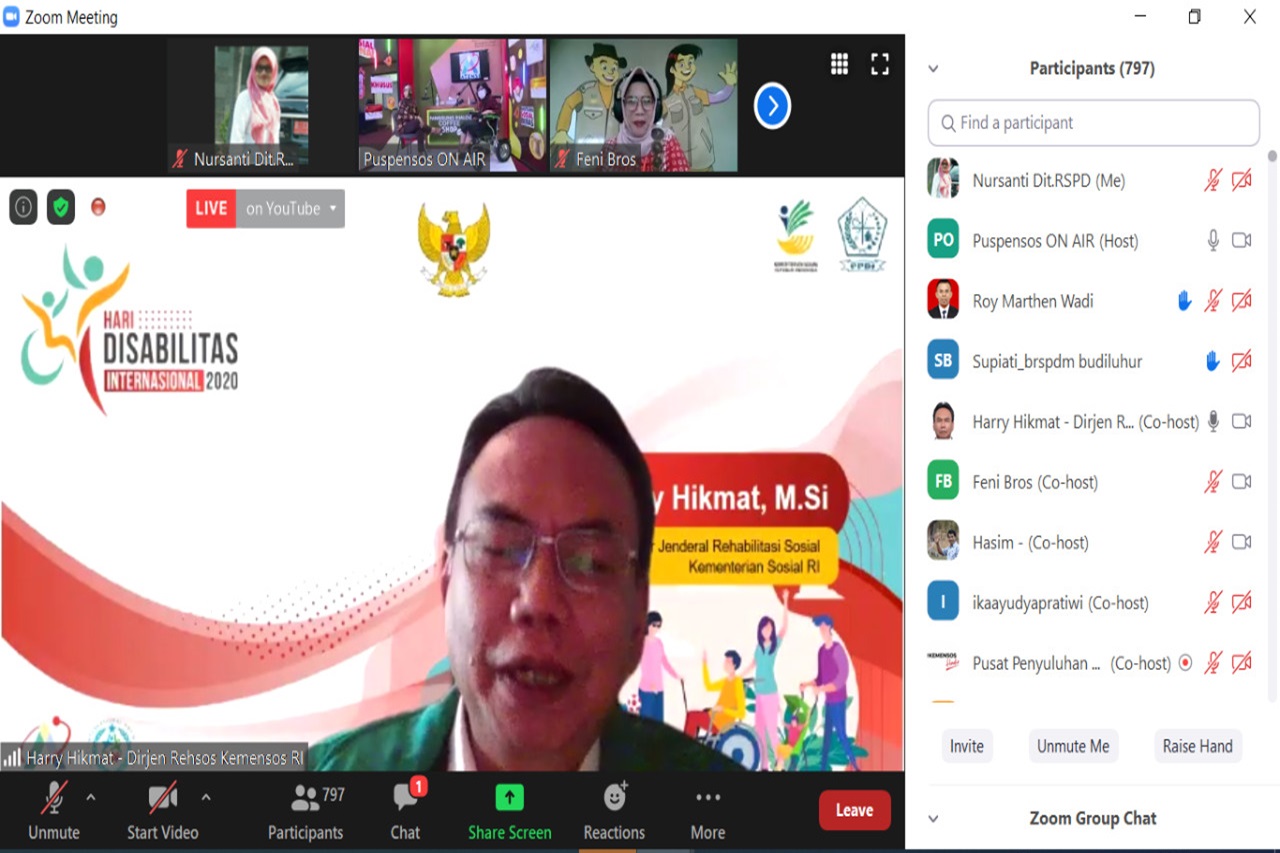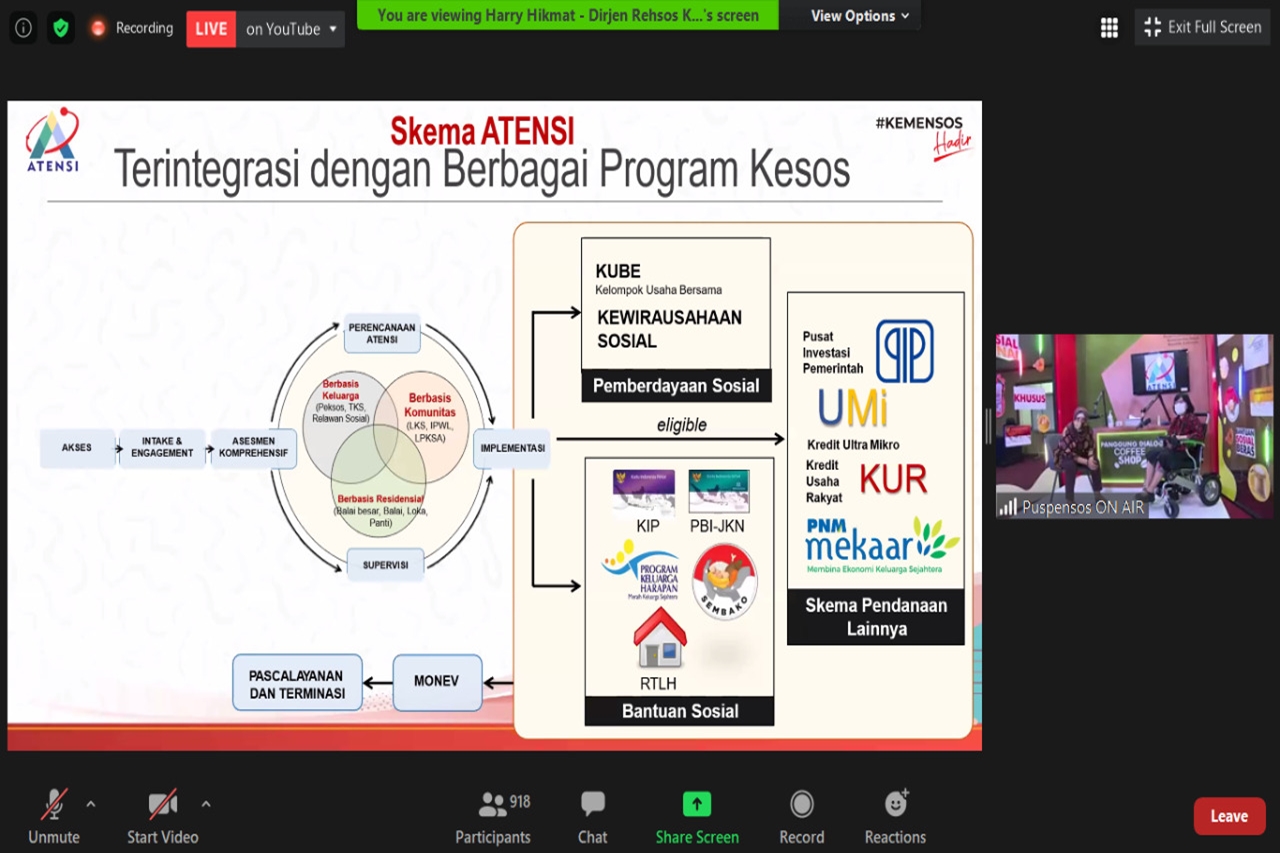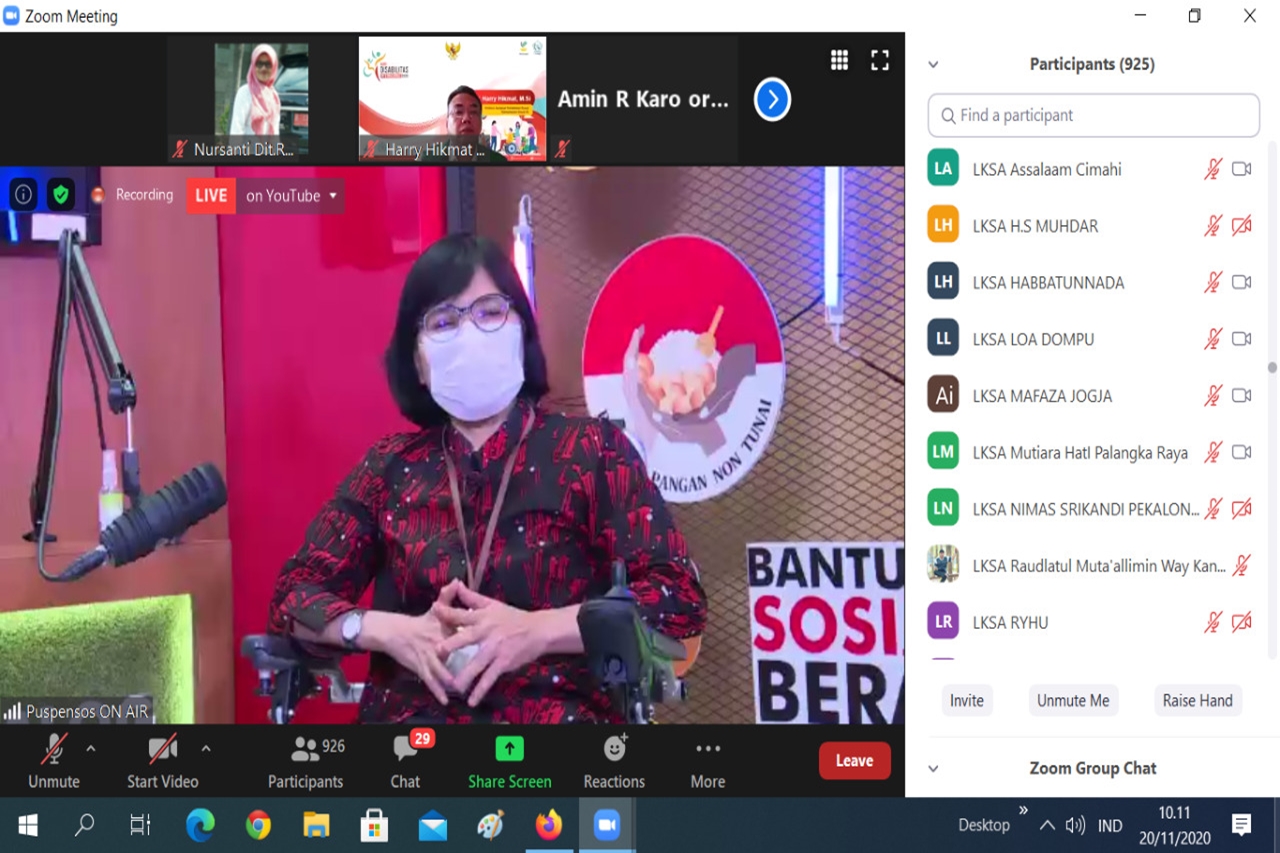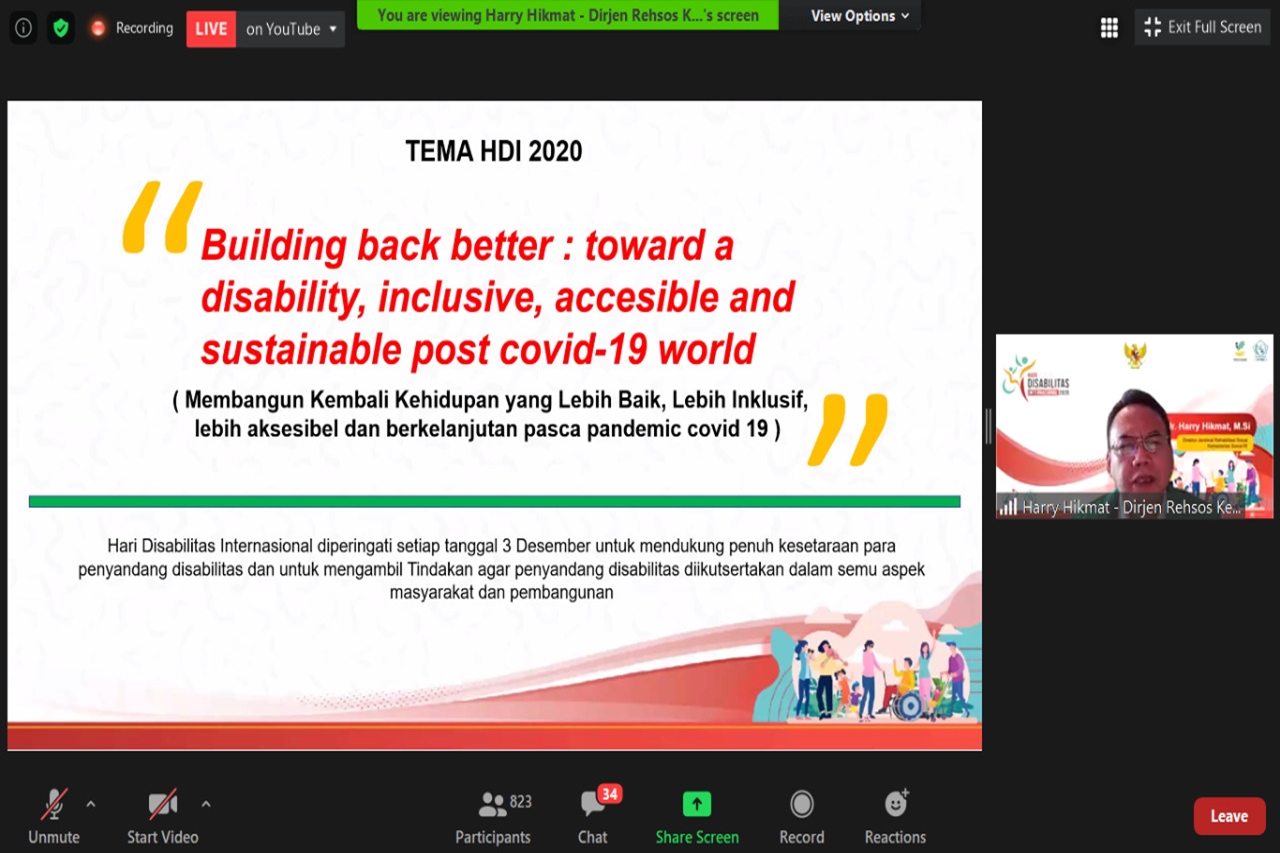JAKARTA (November 20, 2020) - The role of Social Welfare Institutions (LKS) as social organizations or social associations that carry out the implementation of social welfare is very important in the effort to fulfill the needs of persons with disabilities to ensure that no persons with disabilities are left behind in the service process.
The Director General of Social Rehabilitation of the Indonesian Ministry of Social Affairs, Harry Hikmat, explained in more detail the role of LKS in Advocating for Persons with Disabilities at the Virtual Workshop on Bureaucratic Reform Communication, Information and Education (KIE-RB) entitled Morning Coffee. This event was held in collaboration between the Education Research and Social Extension Agency (BP3S), the Organizational and Staffing Bureau and the Directorate General of Social Rehabilitation in order to support the International Day of Persons with Disabilities (HDI) in 2020 with the theme “Rebuilding a better life in an inclusive, accessible and sustainable way. post-COVID-19 pandemic.
The opening of the HDI series of events was officially opened by the Minister of Social Affairs Juliari P Batubara on November 18, 2020 as well as the launching of the website: www.creativedisabilitiesgallery.com as a form of appreciation from the Ministry of Social Affairs for people with disabilities to continue to be creative and carry out creative activities.
“The website will continue to be broadcast even though the peak of the HDI event on December 3 will be over, it will become a common property to support equality of persons with disabilities in the form of a digital platform. This is a real action where people with disabilities can be involved in all aspects of society and development so that it can be widely known by the public," said Harry.
“To increase public awareness, it is necessary to understand the diversity of disabilities, namely physical disabilities, mental disabilities, sensory disabilities, intellectual disabilities, and even multiple disabilities. We strive to respond to the various needs of various disabilities according to our duties, among others, through increasing public awareness and appreciation of their work and potential,” added Harry.
The Director General of Social Rehabilitation of the Indonesian Ministry of Social Affairs, Harry Hikmat, explained in more detail the role of LKS in Advocating for Persons with Disabilities at the Virtual Workshop on Bureaucratic Reform Communication, Information and Education (KIE-RB) entitled Morning Coffee. This event was held in collaboration between the Education Research and Social Extension Agency (BP3S), the Organizational and Staffing Bureau and the Directorate General of Social Rehabilitation in order to support the International Day of Persons with Disabilities (HDI) in 2020 with the theme “Rebuilding a better life in an inclusive, accessible and sustainable way. post-COVID-19 pandemic.
The opening of the HDI series of events was officially opened by the Minister of Social Affairs Juliari P Batubara on November 18, 2020 as well as the launching of the website: www.creativedisabilitiesgallery.com as a form of appreciation from the Ministry of Social Affairs for people with disabilities to continue to be creative and carry out creative activities.
“The website will continue to be broadcast even though the peak of the HDI event on December 3 will be over, it will become a common property to support equality of persons with disabilities in the form of a digital platform. This is a real action where people with disabilities can be involved in all aspects of society and development so that it can be widely known by the public," said Harry.
“To increase public awareness, it is necessary to understand the diversity of disabilities, namely physical disabilities, mental disabilities, sensory disabilities, intellectual disabilities, and even multiple disabilities. We strive to respond to the various needs of various disabilities according to our duties, among others, through increasing public awareness and appreciation of their work and potential,” added Harry.
As an effort to fulfill the needs of persons with disabilities, LKS is very strategic. In the context of social rehabilitation programs, LKS both as implementers, partners as well as potential and sources of social welfare need support, development and utilization, especially in the implementation of the Social Rehabilitation Assistance (ATENSI) program.
"The important role of LKS apart from being involved in the implementation of social rehabilitation is also to carry out prevention functions and activities that are counseling in nature. LKS has a function as a partner of the government, provincial government, and district/city government in the implementation of social welfare," said Harry.
Harry added, the Ministry of Social Affairs encourages all LKS with Disabilities to be registered in the Integrated Data for Social Welfare Service Recipients (PPKS) because LKS have an important role in strengthening the social service system in the community, not only social rehabilitation but also covering aspects of protection, prevention and empowerment. In addition, a condition will be built that LKS is a strategic partner for 19 Social Rehabilitation Centers for Persons with Disabilities throughout Indonesia.
The population of persons with disabilities based on the 2018 Susenas data is 30.4 million. "ATENSI's technical policy consists of several points. First, as a form of respect, protection and fulfillment of the rights of persons with disabilities. Second, the implementation of the social rehabilitation system must be integrated with social security, social empowerment and social protection for persons with disabilities," explained Harry.
Third, the need to expand the reach of family, community and residential-based social rehabilitation for persons with disabilities; fourth, there is an effort to strengthen the capacity and institutions of the Social Rehabilitation Center and LKS. Fifth, increasing prevention, education and sensitization campaigns in all sectors and the community, followed by the sixth policy, namely by increasing the role of the community and the private sector in social rehabilitation services.
The Ministry of Social Affairs has made various changes to the service paradigm, namely integrated and sustainable social services (one stop service/single window service) through the development of Social Service Centers (SERASI). “Reaching out to all residents who experience social problems (universal approach) and inclusive strategies, as well as comprehensive, standardized, institutionalized and professional social rehabilitation programs. And also the increase in competence that is needed by social workers, therapists, counselors, care givers who must have specialist competencies," said Harry.
Residential services through Social Rehabilitation Centers and LKS are the last alternative if family and community-based services are still capable. Nurture and care in LKS can guarantee the quality of social welfare to fulfill the physical, psychological and social needs of beneficiaries which is carried out on a temporary basis. So this is where the presence of LKS is very important to partner directly with the Ministry of Social Affairs.
"The important role of LKS apart from being involved in the implementation of social rehabilitation is also to carry out prevention functions and activities that are counseling in nature. LKS has a function as a partner of the government, provincial government, and district/city government in the implementation of social welfare," said Harry.
Harry added, the Ministry of Social Affairs encourages all LKS with Disabilities to be registered in the Integrated Data for Social Welfare Service Recipients (PPKS) because LKS have an important role in strengthening the social service system in the community, not only social rehabilitation but also covering aspects of protection, prevention and empowerment. In addition, a condition will be built that LKS is a strategic partner for 19 Social Rehabilitation Centers for Persons with Disabilities throughout Indonesia.
The population of persons with disabilities based on the 2018 Susenas data is 30.4 million. "ATENSI's technical policy consists of several points. First, as a form of respect, protection and fulfillment of the rights of persons with disabilities. Second, the implementation of the social rehabilitation system must be integrated with social security, social empowerment and social protection for persons with disabilities," explained Harry.
Third, the need to expand the reach of family, community and residential-based social rehabilitation for persons with disabilities; fourth, there is an effort to strengthen the capacity and institutions of the Social Rehabilitation Center and LKS. Fifth, increasing prevention, education and sensitization campaigns in all sectors and the community, followed by the sixth policy, namely by increasing the role of the community and the private sector in social rehabilitation services.
The Ministry of Social Affairs has made various changes to the service paradigm, namely integrated and sustainable social services (one stop service/single window service) through the development of Social Service Centers (SERASI). “Reaching out to all residents who experience social problems (universal approach) and inclusive strategies, as well as comprehensive, standardized, institutionalized and professional social rehabilitation programs. And also the increase in competence that is needed by social workers, therapists, counselors, care givers who must have specialist competencies," said Harry.
Residential services through Social Rehabilitation Centers and LKS are the last alternative if family and community-based services are still capable. Nurture and care in LKS can guarantee the quality of social welfare to fulfill the physical, psychological and social needs of beneficiaries which is carried out on a temporary basis. So this is where the presence of LKS is very important to partner directly with the Ministry of Social Affairs.
Strengthening capacity and institutions is not only for LKS, but also for Social Rehabilitation Centers as potential implementers of ATENSI. "Regarding the LKS accreditation carried out by Pusbangprof and the Accreditation Center for Social Welfare Institutions (BALKS) they already have instruments and indicators. This aims to ensure that LKS are real, have programs, have human resources, facilities and infrastructure and services that can be accounted for," said Harry.
"The government's responsibility is to register organized LKS. LKS should have the initiative to participate in the accreditation system. Likewise, the importance of strengthening human resources through training and certification must be pursued by all parties," he added.
On the same occasion, the duties and functions of the LKS were explained by the Director of Social Rehabilitation for Persons with Disabilities Eva Rahmi Kasim. "According to the new platform of the Directorate General of Social Rehabilitation, ATENSI for Persons with Disabilities is a direct service carried out by the Technical Implementation Unit (UPT) of the Ministry of Social Affairs through the Social Rehabilitation Center for Persons with Disabilities," said Eva.
"There are three pillars in its implementation, namely through family, community and residential. LKS is included in the residential approach," added Eva.
The implementation of ATENSI has 7 components consisting of support for fulfilling a decent life, social care and/or child care, family support and therapy (physical, psychosocial, and mental-spiritual therapy). Then, vocational training and entrepreneurship coaching, social assistance and social assistance as well as accessibility support.
“The duties and functions of LKS with Disabilities are in accordance with the specificity of each LKS. For example, LKS which focus on therapy is a form of cooperation in providing therapy for beneficiaries," said Eva.
Eva added that the Ministry of Social Affairs in carrying out other forms of social rehabilitation is not alone but partners with LKS in the community. "To become a partner of the Ministry of Social Affairs, of course, you must meet standardized terms and conditions. Standard operating procedures, complete legality and human resources," Eva explained.
LKS for Persons with Disabilities is mostly engaged in advocacy activities, some are residential. "Due to the variety of services and activities of LKS with Disabilities, we hope that from now on LKS will begin to meet LKS accreditation standards at the Ministry of Social Affairs. This is the time to increase capacity and exchange information and experiences," he added.
"The government's responsibility is to register organized LKS. LKS should have the initiative to participate in the accreditation system. Likewise, the importance of strengthening human resources through training and certification must be pursued by all parties," he added.
On the same occasion, the duties and functions of the LKS were explained by the Director of Social Rehabilitation for Persons with Disabilities Eva Rahmi Kasim. "According to the new platform of the Directorate General of Social Rehabilitation, ATENSI for Persons with Disabilities is a direct service carried out by the Technical Implementation Unit (UPT) of the Ministry of Social Affairs through the Social Rehabilitation Center for Persons with Disabilities," said Eva.
"There are three pillars in its implementation, namely through family, community and residential. LKS is included in the residential approach," added Eva.
The implementation of ATENSI has 7 components consisting of support for fulfilling a decent life, social care and/or child care, family support and therapy (physical, psychosocial, and mental-spiritual therapy). Then, vocational training and entrepreneurship coaching, social assistance and social assistance as well as accessibility support.
“The duties and functions of LKS with Disabilities are in accordance with the specificity of each LKS. For example, LKS which focus on therapy is a form of cooperation in providing therapy for beneficiaries," said Eva.
Eva added that the Ministry of Social Affairs in carrying out other forms of social rehabilitation is not alone but partners with LKS in the community. "To become a partner of the Ministry of Social Affairs, of course, you must meet standardized terms and conditions. Standard operating procedures, complete legality and human resources," Eva explained.
LKS for Persons with Disabilities is mostly engaged in advocacy activities, some are residential. "Due to the variety of services and activities of LKS with Disabilities, we hope that from now on LKS will begin to meet LKS accreditation standards at the Ministry of Social Affairs. This is the time to increase capacity and exchange information and experiences," he added.
Also attending the event was the Chairperson of the Manpower Empowerment Institute (LPTK) with Disabilities, Kasih Ani. “In mobilizing our LKS, we are in touch with the community, people with disabilities, the business world and government companies (BUMN). So LKS must first understand the program owned by the company before sending a proposal. For people with disabilities, we divide them according to the skills to be followed and the accessibility of assistive devices to the government," said Ani.
The role of LKS in serving and facilitating government assistance is not only as a distributor, but LKS must also try to build the existing source system. So that collaboration is built between elements of society and participates in respecting, protecting and fulfilling the rights of persons with disabilities.
The role of LKS in serving and facilitating government assistance is not only as a distributor, but LKS must also try to build the existing source system. So that collaboration is built between elements of society and participates in respecting, protecting and fulfilling the rights of persons with disabilities.
 Bahasa
Bahasa
 English
English





